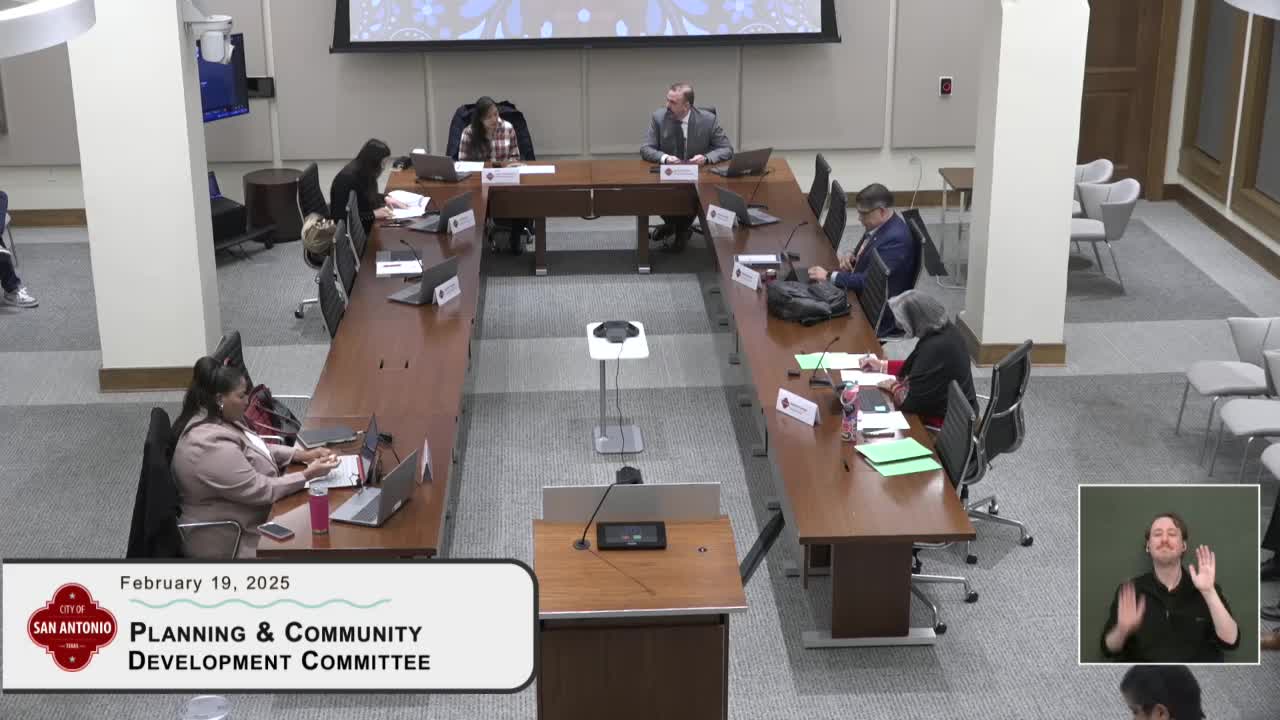San Antonio panel pauses metal-recycling code update after task force members raise equity, attendance and enforcement concerns
Get AI-powered insights, summaries, and transcripts
Subscribe
Summary
The Planning and Community Development Committee paused the task force updating Chapter 11 (fire prevention) and Chapter 16 (licenses and business regulations) for used auto parts and metal recyclers, citing unbalanced attendance, community representation and unresolved hazardous-materials and enforcement language.
The Planning and Community Development Committee (PCDC) on a February 2025 meeting paused work by a stakeholder task force reviewing updates to municipal Chapter 11 (fire prevention) and Chapter 16 (licenses and business regulations) for used auto parts recyclers and metal recycling entities, after community members and some council members raised concerns about attendance, voting balance and enforcement language.
The pause came after several public commenters and task force participants told the committee the working group had an inconsistent mix of industry and community representation and that the process discouraged participation. "We're asking and pleading for, opportunity to actually get to the table and represent our community," said Deborah Ponce, identified in public comment as a District 4 representative to the task force.
Why it matters: committee members and staff said the changes could affect zoning, enforcement authority and hazardous-materials rules near neighborhoods that host recycling and salvage operations. Councilwoman Castillo, who sponsored the Council Consideration Request (CCR) that started the review, said residents "who live off of Quintana Road have shared their concerns about dust, debris, regarding metal and auto recyclers and how it impacts their overall quality of life," citing tire damage, dust settling on homes and possible respiratory impacts.
Staff summary and task force structure
Mike Shannon, director of Development Services, told the committee the task force was originally planned as a roughly even 10-and-10 split of industry and community representatives and that selection criteria required businesses to be licensed and not in litigation or have active violations. "We actually ended up with an 8 and 8 task force to try to keep it balanced," Shannon said, adding that attendance began near 16 per meeting and later dropped to as low as 11 to 13 with uneven representation in some sessions.
Shannon said the task force had held numerous meetings since September on definitions, zoning, nonconforming rights, hazardous materials, fencing and fire protection; the hazardous-materials definition alone required multiple sessions. Staff said they suspended voting on some items as attendance and balance slipped and are preparing a reset that would include alternates, new meeting times and outreach to fill vacancies before resuming work.
Community concerns and requests
Public commenters and task force community members described recurring problems they said undermined the process, including meeting times that conflict with work schedules, perceived procedural irregularities around how definitions and edits were approved, and an industry voting bloc that they said tended to approve edits that community members had opposed. Attorney John Powell, who said he represents Texas Auto Salvage Inc., told the committee he has attended many task force meetings and said, "That CCR request ... has been hijacked. They won't let the good apples on the on the task force. They only let the polluters," urging the council to add environmental experts to the group.
Cheyenne Rendon, introduced as a new District 5 replacement to the task force, told the committee she and other community members want clarity on voting rules (majority vs. consensus), clarity about seats with potential conflicts of interest, and stronger enforcement language or equivalent alternatives if the city is constrained from using specific enforcement mechanisms.
Council and staff direction
Council members who spoke supported a short pause to rebalance the task force rather than abandoning the project. Several members backed adding alternates to ensure seats remain represented, exploring recording (not necessarily live-streaming) task force meetings for reference, and changing meeting days and times — including evenings — to accommodate work schedules. Councilman Biernan asked that task force sessions be recorded and made available for alternates who must catch up on prior discussion.
Shannon told the committee staff will reach out to task force members and the subcommittee (Councilwoman Castillo and Councilwoman Villagran) to identify alternates and possible new appointees, to propose different meeting dates/times, and to compile an attendance report for council offices. He said staff hopes to resume task force meetings in March and to bring recommendations to the committee in the April to late-spring timeframe, but emphasized the goal is to restore balance and produce a higher-quality recommendation rather than move too quickly.
What remains unresolved
Committee members and public speakers identified several unresolved technical and policy issues that the task force has not finalized: precise hazardous-materials definitions and the associated list of materials; zoning limits and the role of city council versus administrative boards in zoning decisions for nonconforming sites; thresholds and procedures for escalating enforcement (including temporary cessation of operations and removal of nonconforming rights); and how to coordinate items that fall under state jurisdiction (for example, actions that may involve the Texas Commission on Environmental Quality).
Next steps
Staff committed to: outreach to fill vacant task force seats and add alternates; provide an attendance report to council members; consider varied meeting times and locations; track topics outside Development Services' scope and note possible state-level referrals; and resume the task force in March with the aim of returning recommendations in April/late spring. The committee did not adopt new code changes at the meeting; staff stopped voting and paused the task force to address process and representation concerns.
Votes at a glance
The committee approved the minutes from the February meeting by voice vote at the start of the session.
